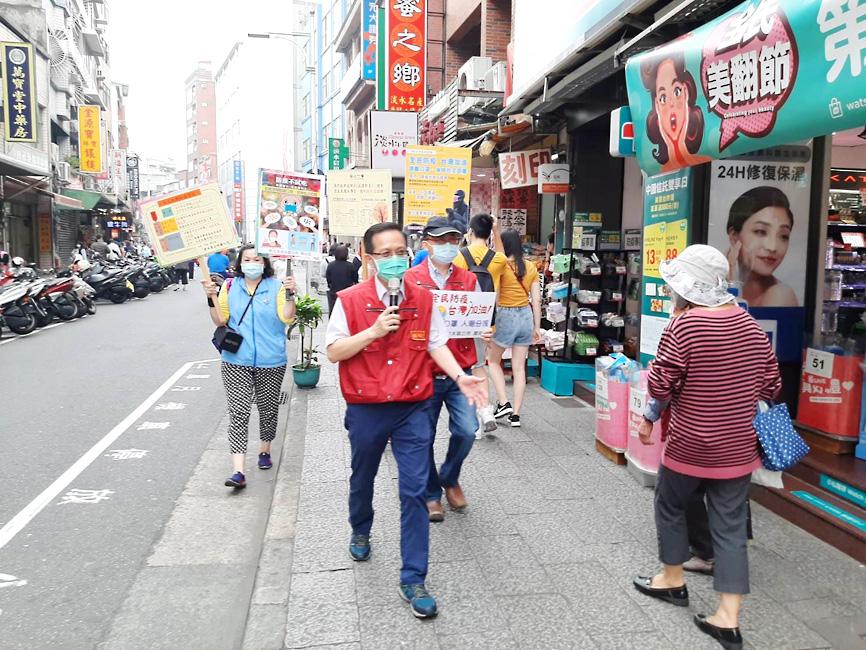The damage from the COVID-19 pandemic to economies in the Asia-Pacific region could reach US$2 trillion through next year, S&P Global Ratings said on Friday, as the coronavirus persists and the recovery of business conditions to pre-pandemic levels looks some way off.
The implementation of social distancing and other containment measures would continue in a bid to mitigate the effects of the outbreak until an effective vaccine is developed, but such practices will likely cause income losses for households and businesses, it said.
“As the COVID-19 pandemic endures, we are learning more about its human, economic and financial costs,” S&P Global Ratings Asia-Pacific chief economist Shaun Roache said in a statement. “The next lesson will be about the cost of transition between lockdown and vaccine.”

Photo: Chen Hsin-yu, Taipei Times
Economies in the region would enter a transition period until the middle of next year, during which social distancing measures would pervade in everyday life, although such constraints might differ by country and could be relaxed or tightened from time to time depending on the epidemic situation, the ratings agency said.
“Economic policies can limit some of the damage during first-wave containment, support the partial recovery through transition, and provide a bridge to the self-sustaining recovery that takes hold in late 2021. However, the costs continue to compound,” it added.
Based on S&P’s estimate, economic growth across the region would slow to 0.3 percent this year, which compares with 4.8 percent growth the agency forecast prior to the pandemic and marks the lowest since the 1.3 percent growth during the Asian financial crisis in 1997.
The IMF last week said that economic growth in the region will likely slow to a standstill this year, which has not happened in the past 60 years.
S&P said that Taiwan’s economy would shrink by 1.2 percent this year, down from its previous estimate of 1.9 percent expansion.
The ratings agency said it expects China’s economy to grow 1.2 percent, down from the 2.9 percent growth it projected earlier.
The agency cut its growth forecast for India from 3.5 percent to 1.8 percent and expects Japan’s economy to contract by 3.6 percent, compared with a decline of 1.2 percent it predicted earlier.
Governments in the region are facing imminent challenges, such as unemployment, from the pandemic, which would cause consumers to become more frugal, increase pressure on more leveraged households and take a toll on the broader economy, S&P said.
“From an economics perspective, the main risk now is unemployment,” Roache said. “Jobs are easily lost, but hard to win back and a surge in unemployment, say by more than 4 percentage points across the region, would mean a much flatter recovery path.”

South Korea’s equity benchmark yesterday crossed a new milestone just a month after surpassing the once-unthinkable 5,000 mark as surging global memory demand powers the country’s biggest chipmakers. The KOSPI advanced as much as 2.6 percent to a record 6,123, with Samsung Electronics Co and SK Hynix Inc each gaining more than 2 percent. With the benchmark now up 45 percent this year, South Korea’s stock market capitalization has also moved past France’s, following last month’s overtaking of Germany’s. Long overlooked by foreign funds, despite being undervalued, South Korean stocks have now emerged as clear winners in the global market. The so-called “artificial intelligence

NEW IDENTITY: Known for its software, India has expanded into hardware, with its semiconductor industry growing from US$38bn in 2023 to US$45bn to US$50bn India on Saturday inaugurated its first semiconductor assembly and test facility, a milestone in the government’s push to reduce dependence on foreign chipmakers and stake a claim in a sector dominated by China. Indian Prime Minister Narendra Modi opened US firm Micron Technology Inc’s semiconductor assembly, test and packaging unit in his home state of Gujarat, hailing the “dawn of a new era” for India’s technology ambitions. “When young Indians look back in the future, they will see this decade as the turning point in our tech future,” Modi told the event, which was broadcast on his YouTube channel. The plant would convert

‘SEISMIC SHIFT’: The researcher forecast there would be about 1.1 billion mobile shipments this year, down from 1.26 billion the prior year and erasing years of gains The global smartphone market is expected to contract 12.9 percent this year due to the unprecedented memorychip shortage, marking “a crisis like no other,” researcher International Data Corp (IDC) said. The new forecast, a dramatic revision down from earlier estimates, gives the latest accounting of the ongoing memory crunch that is affecting every corner of the electronics industry. The demand for advanced memory to power artificial intelligence (AI) tasks has drained global supply until well into next year and jeopardizes the business model of many smartphone makers. IDC forecast about 1.1 billion mobile shipments this year, down from 1.26 billion the prior

People stand in a Pokemon store in Tokyo on Thursday. One of the world highest-grossing franchises is celebrated its 30th anniversary yesterday.